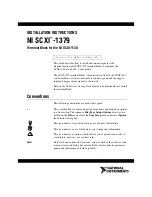
POS–3000
© Elcom, s. r. o.
41
POS programming
Assignment of keys to common functions
The left part of the dialogue serves for assigning keys to common functions.
Using the
Previous
/
Next
buttons (or by using the
Tab
and
Space
keys on the screen but-
tons) select the function you want to assign a new key to. Press the
Set
button (or move to the
button using
Tab
and then
Space
). A prompt window to press the desired key appears. Press
that key. The row next to the function label shows the code of the pressed key.
Direct PLU keys programming
The menu element designated as PLU serves for direct PLU keys programming.
Enter the PLU code that you want to assign a direct key to into the PLU text row (tap the row
on the display or use
Tab
key to position the cursor into the row). Press the
Set
button (or
select the button using
Tab
and press
Space
). A query window for pressing the desired direct
PLU key appears. Press that key.
If there is no direct key assigned to the selected PLU, the right row contains zero (0). Ma-
ximum possible number of programmed direct PLU keys is 100 (provided you have a suf-
ficiently large keyboard). If you want to remove an assigned direct PLU key, use the same
procedure, but press the
Clear
button instead.
Direct surcharge/discount keys programming
The menu designated as Disc/Add works for direct surcharge/discount keys programming.
Enter the surcharge/discount ID code that you want to assign a direct key to into the
Disc/
add
text row (tap the row on the display or use
Tab
key to position the cursor into said row).
Press the
Set
button (or select the button using
Tab
and press
Space
). A query window for
pressing the desired direct surcharge/discount key appears. Press that key.
If there is no direct key assigned to the selected surcharge/discount, the right row contains
zero (0). Maximum possible number of programmed direct surcharge/discount keys is 12. If
you want to remove an assigned direct surcharge/discount key, use the same procedure, but
press the
Clear
button instead.
Keyboard button
There are situations when no keybo-
ard is attached to the cash register. In
such cases it is possible to display the
virtual keyboard on the display. The
Keyboard button
is
loca-
< Figure
3.17
Keyboard programming
dialogue
< Figure
3.18
Virtual keyboard
Summary of Contents for POS-3000
Page 1: ...POS User manual application version 1 85 manual version 2 0 16...
Page 6: ...POS 3000 Elcom s r o...
Page 10: ...POS 3000 Elcom s r o...
Page 44: ...POS 3000 Elcom s r o...
Page 62: ...POS 3000 Elcom s r o 62 Training mode Figure 6 4 The testing window of the training mode...
Page 64: ...POS 3000 Elcom s r o...
















































